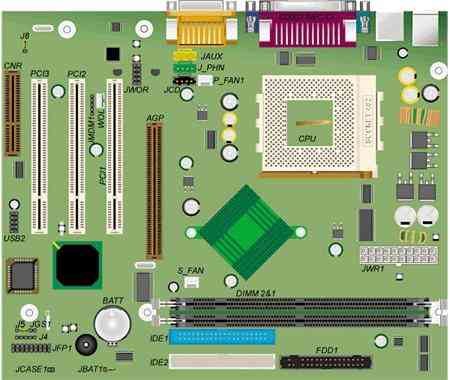 Acer File Extensions |
Packard Bell Halley M/Board

The Halley motherboard is almost identical to the Florida motherboard. Both are described as MSI-6340 by the manufacturer MSI. The difference is in the chipsets: the Florida uses the VIA« Apollo KT133 chipset, and the Halley has the VIA« Apollo KM133 chipset. This chipset has the S3 ProSavage 4 video chipset integrated, giving the Halley integrated video as well as an AGP-port for AGP video-cards.
Specification
- Audio: Integrated on the VIA Technologies’ VT1611A 18-audio Codec
- Bios: AMI
- Chipset: VIA KM133, including the VIA VT8365A Northbridge controller, and the VIA VT 686B Southbridge controller.
- CPU Support :
- Socket 462 for AMD PGA Duron/Athlon processor.
- 100 MHz Host bus speed (uses dual clocking to obtain 200 MHz FSB)
- Supports 200 MHz FSB Duron CPU at 950 MHz maximum
- Supports 200 MHz FSB Athlon CPU at 1200 MHz maximum
- Note: above CPU's are only supported with the latest BIOS version.
- Form Factor : ATX 24.4 cm. × 20.0 cm Form Factor
- RAM :
- 4 memory banks (2 slots) using three 168-pin unbuffered DIMM.
- Single or double sided DIMMS with gold-plated contacts with clock specifications of 100 or 133 MHz.
CPU Bus Frequency Memory Frequency Supported 100 MHz 66, 100 or 133 MHz 200 MHz 100 or 133 MHz
- Supports a maximum memory size of 1 GB
- 512 (128-bit technology) or 256 MB (64-bit technology) registered DIMMs
- 1 GB unregistered DIMMS (256-bit technology)
- 3.3 V SDRAM DIMMs.
- ECC memory checking is not supported
- Video: Integrated Savage4 2D/3D Video Accelerator
Jumpers
| Jumper | Configuration |
|---|---|
| JBAT1 - Clear CMOS jumper | 1-2: Normal operation (default) 2-3: Clear current BIOS |
| J5 - Bios Configuration Access | 1-2: Normal operation (default) 2-3: Access BIOS maintenance Panel None: BIOS Recovery |